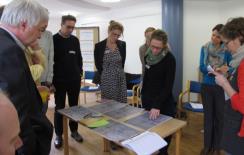Blue Planning in Practice – test training
From 19-21 April 2016, ten marine spatial planning experts from various intergovernmental and non-governmental organisations and 6 countries met in Frankfurt, Germany to test the new training course called “Blue Planning in Practice”.
This course is being designed by the Blue Solutions Initiative to enable planners and decision makers to develop and engage in marine and coastal planning and implementation processes in different contexts and settings, at a broad range of scales. This is a participatory training course that can be used to support a breadth of planning processes in the marine and coastal realm thanks to its modular structure.
 The test training is part of a one-year development process of the Blue Planning in Practice training course. During this process a broad range of experts and practitioners from around the world contributed to the conceptualization of the training course, the design of the modular course structure, as well as the training materials based on their own experiences and publications.
The test training is part of a one-year development process of the Blue Planning in Practice training course. During this process a broad range of experts and practitioners from around the world contributed to the conceptualization of the training course, the design of the modular course structure, as well as the training materials based on their own experiences and publications.
The objective of the test training was to present the developed training material to experts and to collect their feedback on it. The comments, suggestions and advice provided shall serve as a basis to improve and finalise the training material.
 After wearing the hat of participant and performing themselves some of the exercises of the training, experts provided highly valuable feedbacks on the content, target audience, learning objectives and structure of the proposed training material. Case studies from their own experiences provided during the course of these three intensive days also constituted valuable inputs to enrich the training development process.
After wearing the hat of participant and performing themselves some of the exercises of the training, experts provided highly valuable feedbacks on the content, target audience, learning objectives and structure of the proposed training material. Case studies from their own experiences provided during the course of these three intensive days also constituted valuable inputs to enrich the training development process.
The course was introduced using the fictive country of Bakul based on the Harvard Case Methodology. This methodology allows participants to learn through interactive practical work. It also forms the basis for the existing Blue Solutions courses on
Integrating ecosystem services into coastal and marine development planning (Blue IES), and
Climate change adaptation in coastal and marine areas (Blue CCA).
The existing training course is comprised of seven themes relevant for planning processes in the coastal and marine realm. These modules can be applied with different levels of intensity and in varying sequence, depending on specific capacity development demands:
- Scoping and getting organised
- Organization of stakeholder participation
- Inventory and analysis of current and future status and stakeholder interests
- Drafting a Spatial Management Plan
- Negotiation, refinement and approval of Spatial Management Plan
- Implementation and enforcement of the Spatial Management Plan
- Monitoring, revising and adjusting the Spatial Management Plan
 The modules contain several training elements: case work group exercises, theoretical inputs and interactive learning sessions. The inputs and exercises build on one another. This didactic training is based on practical experiences and contains real-life case studies (Blue Solutions) showcasing how processes have worked in reality.
The modules contain several training elements: case work group exercises, theoretical inputs and interactive learning sessions. The inputs and exercises build on one another. This didactic training is based on practical experiences and contains real-life case studies (Blue Solutions) showcasing how processes have worked in reality.
The exercises also build on enabling factors and key challenges to Marine Spatial Planning, derived from the study Evidence-based analysis and practical guidance on the challenges and enabling factors for successful Marine Spatial Planning (Thomas, H. L et al., 2016).
The course design and target audiences were discussed in depth at the test training. Overall, it was confirmed that the course design should follow a modular framework with a maximum duration of 5 days, but adaptable to different demands and contexts.
The next steps in the development of this course will be the refinement of the training materials by end of June according to the feedback collected, the constitution of a pool of trainers, and the conduction of a first pilot training in English by end of 2016. The course should then be made available for open-source use early 2017 and translated in other languages by mid-2017. The final training material will be available open-source should give practical guidance on how to effectively and outcome-focused conduct and implement marine and coastal planning processes.
For further information, please contact Jan Kleine Büning.


